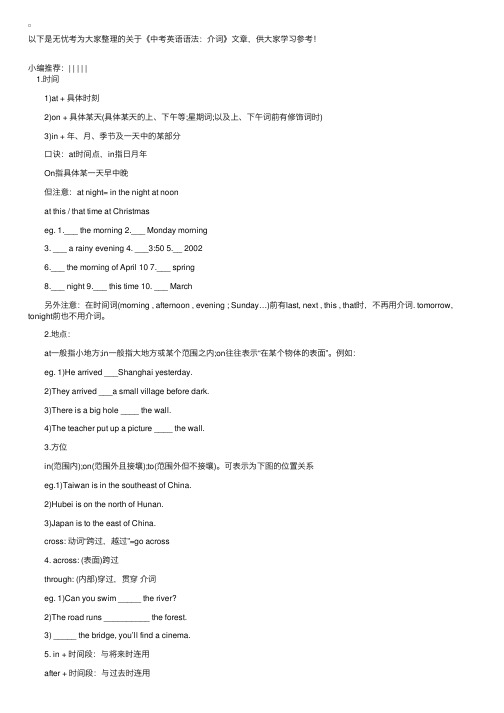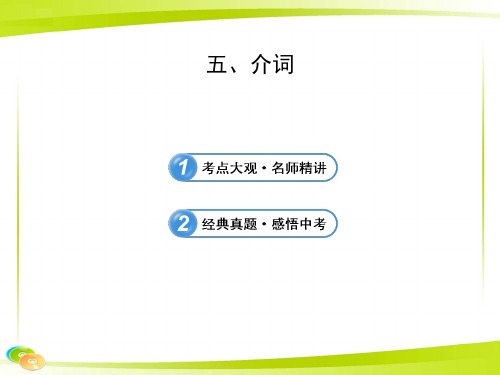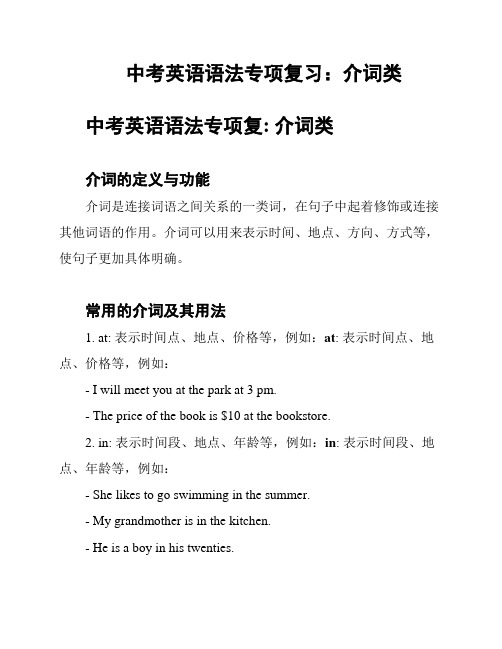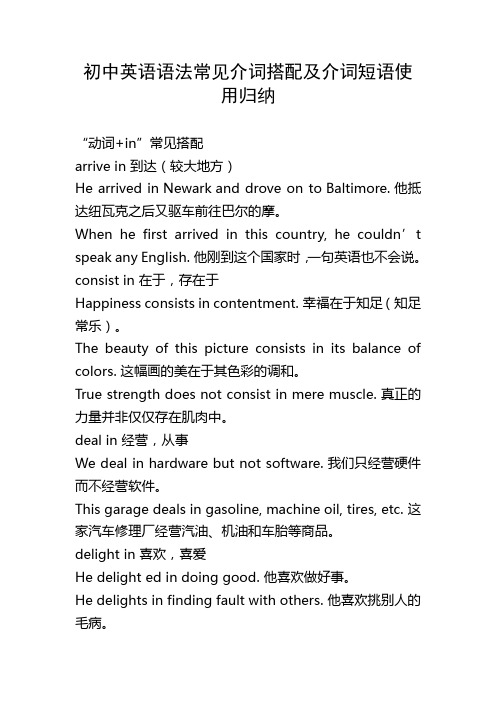中考英语-语法-介词
初中英语中考语法复习介词知识点

中考英语语法复习介词知识点1.简单介词in on with by for at about under of to at until from before after during above under2.合成介词into within inside outside without throughout3.短语介词according to, because of,in front of,in spite of4.时间介词at、on、in、before、after、during、from、about、by、until5.地点介词in、on、under、at、above、behind、before6.介词用法年月周前要用 in,日子前面却不行。
遇到几号要用"on",上午下午又是"in"要说某日上下午,用 on 换 in 才能行。
午夜黄昏用 at,黎明用它也不错。
at 也在时分前,说"差"用 to,说"过"要用past。
用in:年、月、季节、周、阳光、灯、影、衣、冒(雨)用in;将来时态in表后;小处at,大处in;语言、单位、材料in。
用on:步行、驴、马、玩笑on用at:山脚、门口、在当前,速、温、日落、价、核心用with:具有、工具、和、同随有形with无形by;(with后加工具,工具是有形的;by后加方式,方式是无形的)7.动词+介词常用短语About的短语think about 考虑bring about 导致;引起care about 关心;在意dream about 梦想;梦见hear about 听说hang about 闲逛learn about 了解know about 知道;了解look about 环顾;四处看talk about 谈论;议论worry about 担心write about 编写;写作At的短语arrive at 到达knock at 敲laugh at 嘲笑look at 看point at 指向shout at 朝……大喊smile at 对……微笑throw at 朝……扔Away的短语put away 储存;放好keep sb./sth. away (使)避开;(使)不靠近blow away 吹走,驱散stay away from 与……保持距离;远离give away 赠送get away 逃离move away 搬走go away 离开run away 逃跑,跑掉pass away 去世throw away 扔掉take away 拿走;带走wash away 冲走walk away 起开,离去Back的短语bring back 恢复;使想起;归还give back 归还call(sb.) back 给(某人)回电话go back 回去come back 回来;再度流行pay back 偿还(借款等)get back 回来;返回;回家Down的短语write down 写下;记下take down 拆掉;取下;记下1break down 停止运转;(机器等)出故障turn down 把调低;关小;拒绝calm down 冷静下来cut down 砍倒;缩减die down 减弱;逐渐平息fall down 倒塌;跌倒lie down 躺下pull down 拆除;摧毁put down 放下;记下sit down 坐下slow down (使)减速;(使)放松For的短语search for 搜索;查找thanks for 因……而感激die for 为而死care for 照顾;关怀look for 寻找leave for 动身去pay for 为……付钱stand for 代表prepare for 为……做准备wait for 等待Off的短语burn off 燃烧turn off 关掉cut off 切断;中断break off 突然中止;中断give off 散发;释放get off 下车keep off (使)不接近;远离go off 熄灭;响起put off 推迟;拖延pay off 还清(欠款);成功see off 送行run off 跑掉;逃跑show off 炫耀;显摆set off 动身;启程;使爆炸take off 脱下衣服;(飞机等)起飞shut off 关闭;停止运转On的短语hold on 等一等(别挂电话)pass on 传递keep on 继续(进行)try on 试穿take on 承担;呈现work on 从事;忙于agree on 对意见……一致come on 加油carry on 继续call on 访问;拜访depend on 依靠;依赖;视……而定;取决于decide on 决定;选定get on 上车;进展go on 继续live/feed on 以……为食;靠……谋生put on 穿上;增重;上演turn on 打开Up的短语drive up 开车end up 最终;结束;到头来fill up 装满;填补fix up 修理give up 放弃make up 编造;化妆pick up 接(某人);捡起look up 查阅;查找set up 建立;创立;建造show up 出席;露面take up 开始做;从事;占据stay up 不睡觉;熬夜turn up 调高(音量);出现wake up 睡醒;醒来bring up 养育;提出grow up 成长;长大cheer up 使……振奋;hurry up 赶紧clean up 把(……)打扫干净;put up 张贴;举起;搭建cut up 切碎stand up 站起来dress up 穿上盛装;装扮With的短语deal with 处理;应付play with 和……玩耍agree with 赞同;持相同意见catch up with 赶上(或超过)begin/start with 以……开始come up with 提出;想出(主意、回答等)communicate with 和……交流end up with 以……结束connect with 与……联系talk with 和……交谈part with 放弃;舍弃(尤其不舍得的东西);与……分开get along with 和……相处2。
初中英语中考语法知识介词分类讲解(共18类)

中考英语介词分类讲解一、表示方位in:在某块更大地域的内部on:两块地接壤, 挨着to:两块地不接壤, 中间隔着【例】上海位于中国的东部.Shanghai is in the east of China.(上海是中国境内的一座城市, 处于中国内部)广东在广西的东南边.Guangdong is on the southeast of Guangxi.(广东与广西挨着, 两块地域相邻)台湾在福建省的东南面.Taiwan is to the southeast of Fujian.(台湾与福建隔海相望, 中间并不接壤, 隔得较远)east东south南west西north北①以上4个方位词既是名词(n.),又是副词(adv.)②两两组合, 就可以组成:东南southeast、东北northeast、西南southwest、西北southnorth另4个方向.【例】向西走用名词:go to the west(west属于特指, 前面必须加定冠词the)所有特指的名词前面都要加the, 比如太阳☀️只有一个, 使用时-the Sun, 同理月亮 -theMoongo是不及物动词(vi),后面跟名词必须要加介词to(不清楚及物动词/不及物动词的小伙伴, 请跳转 :【笔记】英语语法入门到精通(17)| 动词之:及物动词&不及物动词)用副词:go west(这里副词west修饰动词go)【例】向西走10米.go west/ go to the west ___ 10 meters.根据之前的结构判断原则, 10米属于名词, 前面的结构是完整的, 只不过省略了主语.go west是谓语+adv.,这里可以看成是主谓+adv., 结构完整.go to the west中, go是谓语, 介词to和名词the west共同构成介词短语, 整体也可看成主谓+介词短语, 结构完整.剩下的10meters是名词, 而完整的句子结构后面只能是adv./介词短语, 因此空行里一定是介词.答案:go west/ go to the west for 10 meters.二、表示上下↑在....上:over、above、on↓在....下:beneath、under、below①正上-正下:over-underover还有覆盖在某物体上面的意思, 也属于接触面, 但注意和on的区别, on只表示在物体表面, 没有覆盖的意思.②非正上-非正下:above-below不强调正上方/正下方时, 只要是上/下方都可以用.③表面上-表面下:on-beneath【例】你头顶正上方有一幅画.There is a painting over your head.树下面有一只大象 .There is an elephant under the tree.树上有很多苹果.There are many apples on the tree.(苹果是长在树上 的, 属于接触表面)地下有很多文物.There are a lot of antiques beneath the ground.(也可以用underground一个词表示“地下”)飞机 在云层上飞行.The plane flew above the clouds.气球在房子 上方10米处.A balloon is 10 meters above the house.(可以加具体数量词精确描述)请把你的名字写在下面.Please write your name below.三、表示前后前:in (the)front of/before后:in/at(the)back of/behind【例】那辆车在我的后面.The car is in back of me.The car is at back of me.The car is behind me.(更常用这句)我们在这座雕像前拍照吧.Let's take a photo in front of/before the statue.他坐在教室里的前面.He sits in the front of the classroom.他坐在车里的后面.He sits in the back of the car.He sits at the back of the car.四、表示附近/周围周围:around附近:near旁边:by/beside/next to【例】我手边有一支笔.There is a pen next to/beside my hand.电话在窗户旁边.The telephone is by the window.书在柜子边.The book is beside the cabinet.小狗绕着我跑.The dog ran around me.老师住在我家附近.My teacher lives near my home.五、表示中间两者之间:between在许多东西中间(3个及以上):among在许多东西的正中间(3个及以上):in the middle of【例】他坐在我和Tom的中间.He sits between me and Tom.他们在人群中行走.They walked among the crowds.他在那群人中很优秀.He is outstanding among those people.他正站在人群的正中央.He is standing in the middle of the crowd.六、表示穿越/穿过横穿:across(随随便便地穿过去)从物体内部穿过:through(水从水管流过)从物体上方穿过:over(跨栏杆)从物体旁边穿过:pass/by【例】这条小路穿过一片树林.The path goes through a wood.(小路是从树林里穿过)透过这扇窗, 你能看到一座教堂.Through the window, you can see a church.(through还可以表示目光穿过)我能隔墙听到他们交谈.I can hear their talk through the wall.(through还可以表示透过...听到声音)你穿过这道大门, 就看到左面的房子了.Go through this gate, and you'll see the house on your left.(人走过大门, 也是内部穿过)( 注意:这句话由2个简单句组成,中间逗号隔开, 并用and连接)他独自一人穿越了沙漠.He went across the desert alone.(alone这里做副词)飞机飞过了一座城市.The plane flew(fly过去式) over a city.他跳过了篱笆.He jumped over the fence.我经过了你的家.I passed your home.七、instead / instead of表示代替/而是instead-副词(adv.)instead of-介词【例】他没买手机, 而是买了电脑.① He didn't buy a phone instead of buying a laptop.(1句话)instead of是介词, 后面原本要加名词, 但buy是动词, 放在介词后面要变成ing形式(即动词+ing做为名词成分, 属于非谓语动词的一种, 后面会细讲, 记得关注哦~)句子结构分析:He didn't buy a phone.是一套完整的主谓宾,后面可以直接加介词短语/副词, instead of 是介词, 后面要加名词, 把动词buy变ing形式, 变成名词.② He didn't buy a phone.He bought a laptop instead.(2个简单句)同理, 前后2句都是完整的主谓宾,instead是副词, 原句意是买电脑替代了原本要买的手机, 所以instead放在第2句里.洗淋浴吧, 别用浴缸了.Take a shower instead of a bath.Don't use the bath.Take a shower instead.八、according to / based onaccording to根据based on以...为基础2个都是介词短语, 在句子里前后都能放.【例】据迈克说, 这是一部很棒的电影.According to Mike, it's a great movie.(放句首要用逗号隔开)根据我的经验, 明天会下雪.It will snow tomorrow according to my experience.(不放句首时不用逗号隔开)本书是根据个人经历写成的.The book is based on personal experience.九、besides / except /except for /apart from表示除了...注意区别:besides如果去掉s,就是beside在...旁边besides-表示除了, 还...., 包括“除了”的那部分, 比如:除了喜欢吃香蕉 , 还喜欢吃苹果.两者仍然都属于“喜欢吃”的范围内.except-仅表示除了...之外, 排除意味更明显.except for-用法同except, 但更强调美中不足的那部分.apart from-besides和except的用法都可以用.【例】除了周末我们每天都工作.We work every day except/apart from weekend.(把周末排除在外)除足球外你还喜欢哪些运动?What other sports do you like besides football?(除了喜欢...还喜欢....)除了英语, 我还喜欢数学.I like math besides/apart from English.你英语很好, 除了一些语法错误.Your English is good except for some grammar mistakes.(美中不足)十、ahead of表示在...前面①不同于03部分的方位介词, ahead of的“前面”更宽泛:方位/时间(提前)/能力(优秀)/名次(领先)...② ahead of前面可以加数量词修饰.【例】有两只猫在我们前面.Two cats are ahead of us.(表示方位,可与 03部分的方位词替换)我在最后期限之前完成了作业.I finished homework ahead of the deadline.我们提前15分钟完成了测验.We finished test 15 minutes(数量/时间) ahead of time.她前程远大.She has a great future ahead of her.(a great表示数量多,程度深)她总是遥遥领先班上的同学.She was always(adv.做状语) ahead of her classmates.十一、as for 表示至于...【例】至于作业, 我明天会完成.As for my homework, I will finish it tomorrow.至于这封信, 我交给他了.As for this letter, I gave it to him.至于其他人, 回家吧.As for the others, go home.十二、of/about/on表示关于...of-比较浅显地提及, 聊到, 顺带提一嘴的感觉about-比of稍深入一点, 日常使用on-比较正式介绍时使用, 偏专业【例】昨天晚上他没有提起他妈妈.He didn't talk about his mother last night.他们谈到即将到来的圣诞节.They talk of the coming Christmas.我没有想(考虑)到成本.I don't think of the cost.我得思考一下这件事.I have to think about this thing.这是一本关于历史的书.This is a book on history.十三、like 表示像...like有2种词性:①表示喜欢时, like是动词【例】我喜欢香蕉和苹果.I(主) like(谓) banana and apple(宾).②表示像...时, like是介词,后面+n./doing(动词的名词形式)/从句.【例】我不喜欢像Tom这样的人.I don't like people like Tom.(第一个like是动词, 第二个是介词)她好像我妈妈.She is like my mother.如果“好像”前面没有主语, 用It's like(that)...., that可加可不加.It's not like...(不像.../跟...不一样)【例】好像她说的是真的.It's like (that) what she said is true.好像是他拿走了我的书.It's like (that) he took my book.你并不爱她.It's not like you love her.和上次不一样.It's not like last time.跟我3年前看到的不一样.It's not like what I saw 3 years ago.十四、as 表示当作...as这里作为介词,表示当作..., 中文意思里和like表示像...相近, 但as的所谓“像”的程度比like更深, 甚至可以理解为"就是...(通常是职业或身份)", 而like仅仅是“相像”.【例】她把我当做朋友一样.She treats me as a friend.(像对待朋友一样对待“我”)你可以把那个玻璃杯当作花瓶用.You can use that glass as a vase.他工作起来像个警察.He works as a police.(几乎就是警察)He works like a police.(只是像, 但并不等于就是警察)十五、in exchange/return/reward for...表示作为....的交换/回报/奖励① in exchange for-作为...的交换【例】我用我的照相机交换他的DVD.I gave him my camera in exchange for his DVD.② in return for-作为...的报答【例】为了报答他的帮助,我给他送了份礼物.I gave him a present in return for his help.③ in reward for-作为...的奖励【例】他因勇敢获得了钱.He received money in reward for his bravery.【英语语法笔记(30)】介词(三):表示“原因”的介词大汇总十六、表示原因-Because of(because是连词, 加上of变成了介词)-Due to通常放在句首, 引导一个简单句子或复合句中的从句.它们的语气比较中性, 不会带有太多情感色彩.【例】因为下雨, 他迟到了.Because of the rain, he was late.由于天气炎热, 他决定待在家里.Due to the hot weather, he decided to stay home.-As a result of 作为...的结果表示结果或影响, 通常放在句子的开头或结尾, 引导一个简单句子或复合句中的从句.它的语气比较正式, 有时带有一定的客观性.【例】她因受伤而死亡.She died as a result of her injuries.由于雾太大, 所有航班都延误了.As a result of the heavy fog, all flights have been delayed.-On account of-Owing to表示"由于", 语气比较正式、书面化, 常见于正式文体中.【例】由于天气不好,飞机延迟了.The flight was late on account of the bad weather.The flight was late owing to the bad weather.注意:以上 这些表示原因的词组都属于介词, 后面要加名词/代词/动名词(后2个都相当于名词)十七、thanks to...多亏了...thanks to也有表示原因的意味.【例】多亏了你的帮助, 我才能按时完成项目.Thanks to your help, I was able to finish the project on time.多亏了你, 我们才能出国.Thanks to you, we can go abroad.多亏了你, 现在大家都知道了!Everyone knows about it now, thanks to you!(这句话更贴近咱中文“正话反说”, 或有点儿讽刺意味的那种感觉)十八、for/at/from/of/with/by/out of/through表示原因-for:表示某事发生的原因, 常用于解释某种行为或结果.【例】我对我的错误感到很抱歉.I'm sorry for my mistake.他为迟到道歉.He apologized for being late.-at:表示某个事件A/状态是导致某事B发生的原因.【例】他粗鲁的行为让她生气.She was angry at his rude behavior.Tom的妈妈对Tom的成绩感到很惊讶.Tom's mother was surprised at Tom‘s grades.-from:强调事件发生是源于外部原因-of:强调事件发生是源于内部原因【例】他死于车祸.He died from a car accident.他死于饥饿.He died of starvation.(这里原句可以理解为:他死了, 是因为某个原因, 前半句是个完整句子, 后面加上介词短语表示“原因”)-with:因情绪导致某事或某种状态发生.【例】他激动地大叫.He yelled with excitement.他气得发抖.He shivered with anger.(anger是angry(a.)的名词)-by:通常用by mistake(搞错了)/by chance(偶然)/by accident(意外)【例】他错误地删除了文件.His deleted the file by mistake.警方误抓了他.He has been arrested by mistake.我碰巧在机场遇见她.I met her by chance at the airport.我看见这封信纯属偶然.I saw the letter purely by chance.她碰巧发现了这个问题.She discovered the problem by accident.这不是偶然.It doesn't happen by accident.-out of:表示出于...原因【例】她接受这份工作是出于必要.She took the job out of necessity.他只是出于兴趣做的这份工作.He did this job just out of interest.-through:表示通过...获得结果【例】公司通过创新和辛勤工作取得了成功.The company achieved success through innovation and hard work. 病人通过物理治疗恢复了健康.The patient recovered through a physical therapy.。
中考英语语法:介词

以下是⽆忧考为⼤家整理的关于《中考英语语法:介词》⽂章,供⼤家学习参考!⼩编推荐:| | | | | 1.时间 1)at + 具体时刻 2)on + 具体某天(具体某天的上、下午等;星期词;以及上、下午词前有修饰词时) 3)in + 年、⽉、季节及⼀天中的某部分 ⼝诀:at时间点,in指⽇⽉年 On指具体某⼀天早中晚 但注意:at night= in the night at noon at this / that time at Christmas eg. 1.___ the morning 2.___ Monday morning3. ___ a rainy evening4. ___3:505.__ 20026.___ the morning of April 107.___ spring 8.___ night 9.___ this time 10. ___ March 另外注意:在时间词(morning , afternoon , evening ; Sunday…)前有last, next , this , that时,不再⽤介词. tomorrow, tonight前也不⽤介词。
2.地点: at⼀般指⼩地⽅;in⼀般指⼤地⽅或某个范围之内;on往往表⽰“在某个物体的表⾯”。
例如: eg. 1)He arrived ___Shanghai yesterday. 2)They arrived ___a small village before dark. 3)There is a big hole ____ the wall. 4)The teacher put up a picture ____ the wall. 3.⽅位 in(范围内);on(范围外且接壤);to(范围外但不接壤)。
可表⽰为下图的位置关系 eg.1)Taiwan is in the southeast of China. 2)Hubei is on the north of Hunan. 3)Japan is to the east of China. cross: 动词“跨过,越过”=go across 4. across: (表⾯)跨过 through: (内部)穿过,贯穿介词 eg. 1)Can you swim _____ the river? 2)The road runs __________ the forest. 3) _____ the bridge, you’ll find a cinema. 5. in + 时间段:与将来时连⽤ after + 时间段:与过去时连⽤ 但after + 时间点:可与将来时连⽤。
中考英语语法介词

3. (2011·黄石中考)I wrote _______ my brother last Saturday, but I haven’t heard _______ him up to now.
A. from; to
B. to; of
C. to; to
D. to; from
【解析】选D。write to sb. 给某人写信;hear from sb. 收到某 人的来信。故选D。
3. “前后”介词in front of/in the front of/behind
in front of
表示在某一空间外部的前面
in the front of
表示在某一空间内部的前面
behind
表示在某一位置之后
①There’s a pay phone in front of the library and a swimming pool behind it. 图书馆前面有个投币式电话,后面有个游泳池。 ②The boy likes to sit in the front of his father’s car. 那个男孩喜欢坐在他爸爸的车的前座上。
6. “里外”介词in/inside/into/outside/out of (1)in 在……内部。 (2)inside在……里面/到……里面(强调以……为界),反义词 outside在……外面。 (3)into到……内,其反义短语为out of。
例如:①The pen is in my pencil case. 钢笔在我的铅笔盒里。 ②We are asked to stay inside the building at work. 我们被要求待在楼里工作。 ③Pour some milk into the blender. 把牛奶倒入搅拌机里。
中考英语语法专项复习:介词类

中考英语语法专项复习:介词类中考英语语法专项复: 介词类介词的定义与功能介词是连接词语之间关系的一类词,在句子中起着修饰或连接其他词语的作用。
介词可以用来表示时间、地点、方向、方式等,使句子更加具体明确。
常用的介词及其用法1. at: 表示时间点、地点、价格等,例如:at: 表示时间点、地点、价格等,例如:- I will meet you at the park at 3 pm.- The price of the book is $10 at the bookstore.2. in: 表示时间段、地点、年龄等,例如:in: 表示时间段、地点、年龄等,例如:- She likes to go swimming in the summer.- My grandmother is in the kitchen.- He is a boy in his twenties.3. on: 表示日期、星期几、表面等,例如:on: 表示日期、星期几、表面等,例如:- Our class will have a party on Friday.- There is a book on the table.- She was born on May 5th.4. to: 表示方向、目的、收件人等,例如:to: 表示方向、目的、收件人等,例如:- They went to the park to play soccer.- He gave a gift to his sister.5. from: 表示起点、来源等,例如:from: 表示起点、来源等,例如:- We will drive from Beijing to Shanghai.- The letter is from my friend.6. with: 表示伴随、具备等,例如:with: 表示伴随、具备等,例如:- She likes to go shopping with her friends.- The dog is playing with a ball.注意事项1. 介词的使用需要根据具体语境来决定,不能一概而论。
2023年中考英语语法常见介词搭配及介词短语使用归纳

初中英语语法常见介词搭配及介词短语使用归纳“动词+in”常见搭配arrive in 到达(较大地方)He arrived in Newark and drove on to Baltimore. 他抵达纽瓦克之后又驱车前往巴尔的摩。
When he first arrived in this country, he couldn’t speak any English. 他刚到这个国家时,一句英语也不会说。
consist in 在于,存在于Happiness consists in contentment. 幸福在于知足(知足常乐)。
The beauty of this picture consists in its balance of colors. 这幅画的美在于其色彩的调和。
True strength does not consist in mere muscle. 真正的力量并非仅仅存在肌肉中。
deal in 经营,从事We deal in hardware but not software. 我们只经营硬件而不经营软件。
This garage deals in gasoline, machine oil, tires, etc. 这家汽车修理厂经营汽油、机油和车胎等商品。
delight in 喜欢,喜爱He delight ed in doing good. 他喜欢做好事。
He delights in finding fault with others. 他喜欢挑别人的毛病。
end in 以……结尾(告终)The match ended in a draw. 比赛结果是平局。
It ended in a complete cure. 这病最后完全根治了。
Their marriage ended in divorce.他们的婚姻最终以离婚告终。
engage in 从事,参加,忙于She engaged in dramatics. 她从事戏剧活动。
中考介词冠词代词连词的用法总结
中考介词冠词代词连词的用法总结一、介词的用法总结在学习英语语法中,介词是一个重要的语法项目,它常常和名词、代词或动词等搭配使用,表示名词或代词与其他词语之间的关系。
下面我们就来总结一下中考中常见的介词及其用法。
1. in表示在某个范围或时间内,如 in the room(在房间里),in April(在四月)。
2. on表示在某个具体的物体、表面或方向,如 on the table(在桌子上),on the left(在左边)。
3. at表示在某个具体的地点或时间点,如 at home(在家),at 3 o'clock(在3点)。
4. for表示为了某个目的,如 go out for a walk(出去散步)。
5. by表示通过某种手段或交通工具,如 by train(乘火车)。
二、冠词的用法总结冠词是英语中一个比较难点的语法项目,分为定冠词“the”和不定冠词“a/an”。
下面我们来总结一下中考中常见的冠词用法。
1. 定冠词“the”表示特指,如 the sun(太阳)。
2. 不定冠词“a/an”表示泛指,如 a book(一本书)。
三、代词的用法总结代词是用来代替名词的词语,它能够减少重复,使语言更加简洁。
在中考中,代词也是一个重要的语法项目。
下面我们来总结一下中考中常见的代词及其用法。
1. 人称代词主格:I(我)、you(你)、he(他)、she(她)、it(它)、we(我们)、you(你们)、they(他们)。
宾格:me(我)、you(你)、him(他)、her(她)、it (它)、us(我们)、you(你们)、them(他们)。
形容词性:my/mine(我的)、your/yours(你的)、his(他的)、her/hers(她的)、its(它的)、our/ours(我们的)、your/yours(你们的)、their/theirs(他们的)。
2. 物主代词指代名词所有物,如 mine(我的)、yours(你的)、his(他的)、hers(她的)、its(它的)、ours(我们的)、yours(你们的)、theirs(他们的)。
中考介词归纳总结
中考介词归纳总结在中考中,介词是一个非常重要且常考的语法知识点。
介词在句子中起连接作用,表达时间、地点、方式、原因等关系。
掌握介词用法对于理解和运用英语至关重要。
本文将对中考所涵盖的常见介词进行归纳总结。
一、时间介词1. on:表示某一天或某一天的上午、下午、晚上等特定时间。
例:I will have a meeting on Monday.2. at:表示具体的时间点或特定的时刻。
例:We will meet at 9 o'clock.3. in:表示某一年、月、季节、时间段等。
例:She was born in 2005.例:We usually go swimming in summer.4. during:表示在某一段时间内。
例:He read a book during his summer vacation.二、地点介词1. at:表示具体的地点。
例:She is waiting for you at the bus station.2. on:表示表面或某物之上。
例:There is a book on the table.3. in:表示在某个范围、区域、国家或大洲内。
例:We live in a small town.4. to:表示朝向、方向。
例:He went to the library.三、方式介词1. by:表示通过某种交通方式或手段。
例:I usually go to school by bus.2. with:表示伴随、陪同。
例:She walks to school with her friends.3. in:表示用某种方式或手段。
例:He communicated with her in English.四、原因介词1. for:表示目的、原因或理由。
例:He went to the store for some milk.2. because of:表示因为。
2023年中考英语语法:介词和动词短语课件
单项选择
( 2020·天津)
02 For my fifth birthday, my mother baked me a cake ____ a monkey.
A. at the mercy of B. beyond the reach of C. in the shape of D. on the side of
What Makes You Beautiful One Direction
听歌填词
Everyone else __i_n__ the room can see it Everyone else but you Baby you light _u__p__ my world like nobody else The way that you flip your hair gets me overwhelmed But when you smile __a_t__ the ground it ain't hard to tell You don't know You don't know you're beautiful
介词的功能
1. 拓展形容词
the boy under the tree
树下的男孩
词典中没有一个形容词表示 “在树下的”, 所以, 介词+名词 应运而生。
介词的功能
2. 拓展动词
The boy is looking for his book.
男孩在找他的书。
Look 本身没有 “寻找” 的含义,但是 加上介词for以后,连接了动词和名词 拓展了动词的含义。
初/中/语/法/系/列/课
介词和动词短语
主讲人:
知识清单
初中英语语法复习:介词(中考总复习)
over
经过、跨越。
我们必须越过那座山。
专题五 介 词
返回目录
介词
含义及用法
例句
方
After you go through the gate, you’ll
位
意为“穿过;通过;经过”,
through
see a beautiful garden. 穿过门之后,
指从空间内部通过。
介
你将看到一个美丽的花园。
升
-He came_______Monday.
A.in
B.on
C.to
D.by
专题五 介 词
8.-Please tell me your decision_______tomorrow morning, OK?
拓
-No problem.I will call you tonight.
展
A.before B.during C.through D.since
(台湾是中国的一部分)
专题五 介 词
返回目录
介词
含义及用法
举例
表示“在……(的平面)上”。 on the desk在桌上
(即: )
on the wall在墙上
方
on 表示A地位于B地的外面且接壤 Hunan Province lies on the west of
。 位
(即: )
Jiangxi Province.湖南省在江西省西 边。(湖南省同江西省接壤)
by
the kids playing outside.简站在窗户
位
靠近
旁边,看着外面玩耍的孩子们。
介
There is a football behind the table.
- 1、下载文档前请自行甄别文档内容的完整性,平台不提供额外的编辑、内容补充、找答案等附加服务。
- 2、"仅部分预览"的文档,不可在线预览部分如存在完整性等问题,可反馈申请退款(可完整预览的文档不适用该条件!)。
- 3、如文档侵犯您的权益,请联系客服反馈,我们会尽快为您处理(人工客服工作时间:9:00-18:30)。
(莱芜中考)
—Would you something to drink, Mum?
—Yes, I’d like a cup of coffee _______ nothing in it.
A. with
B. without C. for
D. to
解析:考查介词的用法辨析。句意:——妈妈,你想要喝点 什么吗?——是的,我想要一杯里面什么也不加的咖啡。由 nothing in it“里边什么也不放”可知答案选A,表伴随。 答案: A
( 2 ) 在today, tonight, tomorrow, yesterday, tomorrow morning等表示时间的 名词之前的介词省略。如: My father is leaving for Shanghai tomorrow morning. 我爸爸明天上午去上海。
⑶ “for + 时间或距离”时,在口语中常被省略,但for短语在句首时, 不能省略。如: He has been at home (for) all day. 他在家里待了一整天。 For years he has been in America. 他在美国待了多年。
合成介词
inside 在……里面 outside 在……外面 nearby 在……附近 。within 在……之内
into 到……里面 onto 到……上 throughout 遍及 without 没有
介词短语
at the back of 在……后面 as for 至于 at the bottom of 在……底部 by means of 借助于 in front of 在……前面 in place of 代替 next to 紧靠着
③表示方向
He threw a stone at the dog. 他向狗扔石头。
④固定短语中
at noon在中午
at night在晚上
at present目前
at the beginning (of)在……开始时
at the age of在……岁时
(4)since/ for的用法 ①since + 时间点,表示从过去某时直至现在,主句常用现在完 成时或过去完成时 ②for + 时间段,表示动作的延续,主句常用现在完成时、过去 完成时或一般过去时 I have studied in the school for 5 years since I was 12 years old. 自从我12岁起,我在这所学校学习5年了。
write to 给……写信 look after 照顾 hear from 收到……的来信 get on 上车 put off 推迟 turn on 打开 turn up 调大 talk about 谈论 worry about 为……担忧 knock at/on 敲(门)
3. 与形容词搭配
afraid of 害怕…… good at 擅长 good for 对……有好处 angry with 生……的气 busy with 忙于 famous for 因……出名 far from 离……远 proud of 以……自豪
⑷ “of + 大小、形状、年龄、面积、材料”结构中,of常省略掉。特别是 of后面有the same时。如: He is (of) the same height as his father. 他和他爸爸一样高了。
⑸ 在某些固定短语或习惯用法中省略 spend… (in) doing 在……花费(时间、金钱) be busy (in) doing 忙于做…… have trouble/difficulty/problems (in) doing… 做……有困难/问题 have fun (in) doing… 做……有乐趣 prevent/stop … (from) doing sth. 阻止……做…… (in) this/ that way 以这种/那种方法 There is no use/ good (in) doing sth. 做……没有好处
解析:考查介词用法辨析。句意:大多数村民在六月十八日 上午九点钟参加了龙舟赛。9:00 a.m.表示某一具体时刻,故 用介词at;而the morning of June 18 具体到了某一天的上午, 应用介词on。 答案: B
固定搭配
介词可以和名词、动词、 形容词构成固定搭配。
1. 与名词搭配
pleased with 对……感到满意 friendly to 对……友好 full of 充满 interested in 对……感兴趣 ready for 为……做准备 strict with 对……要求严格 kind to 对……和蔼 surprised at 对……感到惊奇
4.其他常见搭配
(5) 介词 + 名词 + 介词
in place of 代替
in the front of 在……前面
2. 介词短语的功能
(1) 作表语 Mary is in danger now. 玛丽现在处在危险中。
(2) 作状语:表示时间、地点、方式、条件、目的、原因等。 My cousin lives in the countryside. 我表弟住在乡下。(表地点) They will come back in a month. 他们一个月后回来。(表时间)
at seven o’clock(7: 00)在七点钟 at half past five(5: 30) 在五点半
at Christmas 在圣诞节
at dinner time 在吃晚饭时
②表示速度、价格、温度等
The plane flies at 800 kilometers an hour. 飞机每小时飞行800公里。
on March 18th 在3月18号 on Sunday afternoon在星期天下午
on a cold morning 在一个寒冷的早晨
②用在固定短语中
on duty 值班;值日
on weekends 在周末
(3) at的用法
①表示具体的时间点,有时表示在某一节假日;若把一段时间看
做某一时刻,也可用at。
初中英语
八年级上册 第7讲 Units 5-7
介词
1
考点 1 介词的基本用法
介词用在名词或名词性短语前面,用于说明 时间、地点、原因、方式、方法等的词类。 它是一种虚词,在句中不能单独作句子成分。 根据介词的构成形式可将介词分为简单介词、 合成介词、短语介词三类。
简单介词
at 在……点 about 关于 above 在……上 across 通过 after 在……后 along 沿着 among 在……之间 around在……周 围 before 在……之前 behind 在……后 below 在……下 面 between 在……之间 by 由;被;在……旁 down 往下 during 在……期间 except 除……之外 for 为了;对于 from 从 in 在……里面 on 在……上面like 像 near 在……附近 over 在……上面 since 自从 with 和;用 through 穿过 。to 到 until/till 直到 opposite 在……对面
Mr. Smith will get back from US in 2 days. 两天后史密斯先生将从美国回来。
③表示穿着,后面一般跟颜色等。
The woman in green is my mother. 穿绿衣服的那位女士是我妈妈。
④表示“用……语言”
in English/ Chinese 用英语/汉语
ahead of 在……前面 at the top of 在……顶上 because of 因为 in the middle of 在……中间 in the front of 在……前面 instead of 代替 thanks to 幸亏
常见介词用法
(1) in的用法
①表示年、月、季节、世纪、上午、下午、晚上等。
(乌鲁木齐中考)
Most of the villagers took part in the Dragon Boat races
_________ 9:00 a.m. ______the morning of June 18.
A. at; in
B. at; on
C. on; in D. on; on
2. 与动词搭配
listen to 听 look for 寻找 look over 仔细检查 wait for 等待 get off 下车 take off 脱下;起飞 turn off 关闭 turn down 调低 think of 考虑 learn from 向……学习 regard/take …as 把……当做
at first 首先;起初 at home 在家 at least 至少 at present 目前 by the way 顺便问一下 in English 用英语 in time 及时 in danger 处于危险中 in common 共同,共有
at last 最后 at school 在校 at night 在夜间 at the moment 此刻;现在 by oneself 独自 for example 例如 on time 准时 at/on weekends 在周末 at once 马上;立刻
(3) 作后置定语 The girl in red is my sister. 穿红衣服的女孩是我妹妹。 I don’t know the answer to the question. 我不知道这个问题的答案。
(4) 作补足语 We all choose him as our monitor. 我们都选他做我们的班长。 Maria found the city in need of water. 玛利亚发现那个城市缺水。
